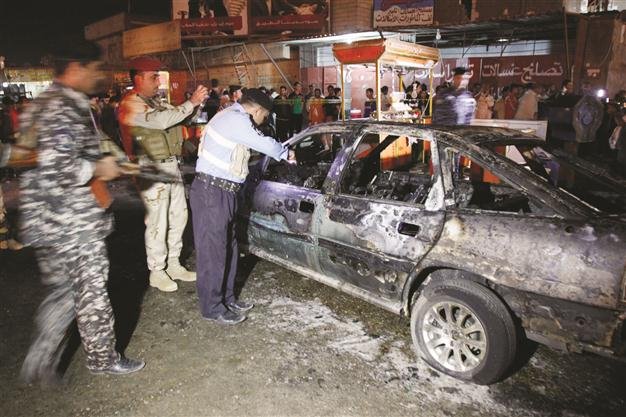Blasts kill 13 in Iraq as US to withdraw
WASHINGTON / BAGHDAD - The Associated Press

Iraqi security forces inspect a destroyed car at the scene of a bomb attack near a cafe where young people were sitting and drinking soft drinks in Basra. AP photo
A pair of near-simultaneous bombings killed six security guards in Iraq yesterday as U.S. troops are preparing to leave by the end of this year. Attacks follow a triple bombing late Nov. 2 in the southern oil port city of Basra, which killed seven people.At least 35 people were wounded in the double-bombing near Baqouba, 60 kilometers northeast of Baghdad, said Diyala Heath Directorate spokesman Faris al-Azawi. “We are trying our best to deal with this situation,” al-Azawi said.
The attack started with a suicide bomber who joined the line of the guards known as Sahwa, and detonated himself around 8 a.m., according to an Interior Ministry official speaking on condition of anonymity because he was not authorized to release the information.
Two minutes later, a car bomb blew up about 30 meters away. The dead all were members of Sahwa, or Awakening Councils, a Sunni militia that sided with U.S. forces against al-Qaeda in a major turning point of the war. The Sahwa have since been targeted by insurgents who call them traitors.
An official at the Baqouba general hospital said at least five soldiers were among the wounded. Violence has dropped dramatically across Iraq, but deadly bombings and shootings still happen nearly every day. Some officials have warned of an increase in attacks as the U.S. withdraws all of its 33,000 troops from Iraq by the end of the year. Thursday’s attacks follow a triple bombing late Nov. 2 in the southern oil port city of Basra, which killed seven people sitting at nearby cafes. Meanwhile, senior U.S. officials say the Pentagon is poised to move at least 4,000 U.S. forces from Iraq to Kuwait at the end of the year. The 1st Brigade of the 1st Cavalry Division would move within weeks as part of a still-developing Pentagon strategy that ends the Iraq war but positions a strong U.S. force just across the border. U.S. officials say the idea is to reinforce America’s military commitment in the Middle East and prevent a power vacuum when the tens of thousands of U.S. forces who have served in Iraq are gone.
















